Daily Vocabulary Words: List of Daily Used Words in Leading Indian Newspapers
Hi there. Welcome to this special section @ Wordpandit. Our endeavour here is straightforward: highlighting daily vocabulary words that you would come across in leading newspapers in the country. We have included the following newspapers in our selection:
• The Times of India
• The Economic Times
• Hindustan Times
• Mint
• Indian Express
We are putting in extensive work to develop your vocabulary. All you have to do is be regular with this section and check out this post daily. This is your repository of commonly used words; essentially, we are posting a list of daily used words. Hence, this has significant practical application as it teaches you words that are commonly used in leading publications mentioned above.
Visit the website daily to learn words from leading Indian newspapers.
WORD-1: Deniability
CONTEXT: This is the first time Tehran has done this, whereas in the past it relied on non-state proxy militias to do its work, giving it plausible deniability and the cover of ambiguity.
SOURCE: Indian Express
EXPLANATORY PARAGRAPH: Imagine you did something you shouldn’t have, but you try to make it seem like you didn’t do it or weren’t involved. That’s like “deniability.” It refers to the ability to deny knowledge or responsibility for something.
MEANING: The ability to deny knowledge or responsibility for something (noun).
PRONUNCIATION: dih-NY-uh-bil-i-tee
SYNONYMS: Plausible deniability, disavowal, denial, evasion, excuse
USAGE EXAMPLES:
1. The politician maintained deniability regarding the scandal.
2. His actions were carefully planned for maximum deniability.
3. The company’s policies were designed to provide executives with plausible deniability.
4. She tried to create a situation of deniability by not leaving any evidence.
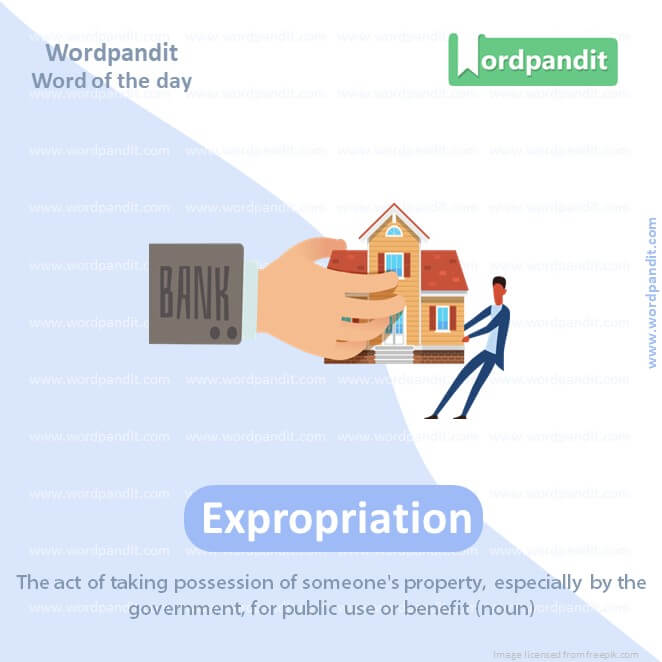
WORD-2: Expropriation
CONTEXT: It wishes to create a greater Israel in the West Bank and engages in acts of repression of Palestinians and expropriation of their land.
SOURCE: Indian Express
EXPLANATORY PARAGRAPH: Imagine someone takes something valuable from you without your permission or without paying for it. That’s like “expropriation.” It means the act of taking possession of someone’s property, often by the government, for public use or benefit.
MEANING: The act of taking possession of someone’s property, especially by the government, for public use or benefit (noun).
PRONUNCIATION: eks-proh-pree-ey-shuhn
SYNONYMS: Confiscation, seizure, appropriation, takeover, nationalization
USAGE EXAMPLES:
1. The expropriation of land for the highway project angered local residents.
2. The government announced the expropriation of abandoned buildings for urban renewal.
3. Legal battles ensued after the expropriation of private property.
4. The company faced protests after the expropriation of ancestral lands.
WORD-3: Ostensibly
CONTEXT: In Saudi Arabia, for example, a country that is ostensibly about to normalise relations with Israel, the war in Gaza has generated nearly two million individual donations for a total of $190 million – this effectively means that half the Saudi population has contributed to alleviate Palestinian suffering.
SOURCE: Indian Express
EXPLANATORY PARAGRAPH: Imagine someone says they’re doing something for a certain reason, but you suspect they have a different, hidden reason. That’s like something being “ostensibly.” It means apparently or seemingly, often used when something’s true purpose or motive is doubted or unclear.
MEANING: Apparently or seemingly, but perhaps not actually (adverb).
PRONUNCIATION: ah-sten-suh-blee
SYNONYMS: Apparently, seemingly, allegedly, purportedly, outwardly
USAGE EXAMPLES:
1. He was ostensibly on vacation, but some suspected he was working secretly.
2. The company’s restructuring was ostensibly for efficiency, but layoffs followed.
3. Her ostensibly friendly gesture had a hidden agenda.
4. The politician’s speech was ostensibly about unity but contained divisive rhetoric.
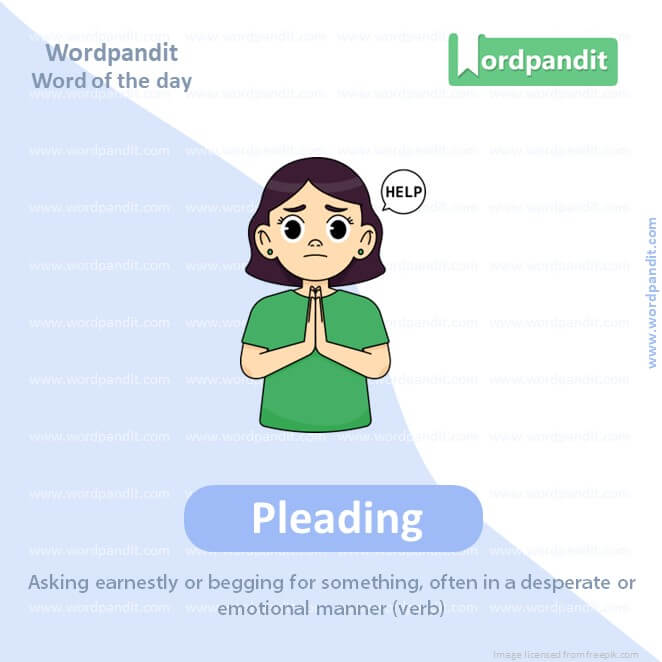
WORD-4: Pleading
CONTEXT: Desiring a different outcome, the US, Jordan, Egypt and the Arab Gulf states such as Saudi Arabia have been pleading with Israel to give binding commitments for the creation of a Palestinian state.
SOURCE: Indian Express
EXPLANATORY PARAGRAPH: Imagine you’re asking for something very earnestly, like when you really want a toy and keep asking your parents for it. That’s like “pleading.” It means asking for something passionately, often in a desperate or emotional manner.
MEANING: Asking earnestly or begging for something, often in a desperate or emotional manner (verb).
PRONUNCIATION: PLEE-ding
SYNONYMS: Begging, imploring, entreating, beseeching, supplicating
USAGE EXAMPLES:
1. She was pleading for forgiveness after the misunderstanding.
2. The homeless man was pleading for food and shelter.
3. He pleaded with the judge for a lighter sentence.
4. The child’s pleading eyes melted his father’s heart.
WORD-5: Coherent
CONTEXT: It is stuck in the old politics of caste and communal faultlines, dynastic entitlement and a general lack of a coherent vision.
SOURCE: Indian Express
EXPLANATORY PARAGRAPH: Imagine putting together a puzzle where all the pieces fit perfectly, and the picture makes sense. That’s like something being “coherent.” It means logical and consistent, where all parts work together in a clear and understandable way.
MEANING: Logical and consistent, making sense as a whole (adjective).
PRONUNCIATION: koh-HEER-uhnt
SYNONYMS: Logical, consistent, cohesive, unified, rational
USAGE EXAMPLES:
1. Her argument was coherent and persuasive.
2. The plan lacked coherent steps for implementation.
3. The book provided a coherent explanation of complex theories.
4. The speaker struggled to present a coherent narrative during the interview.
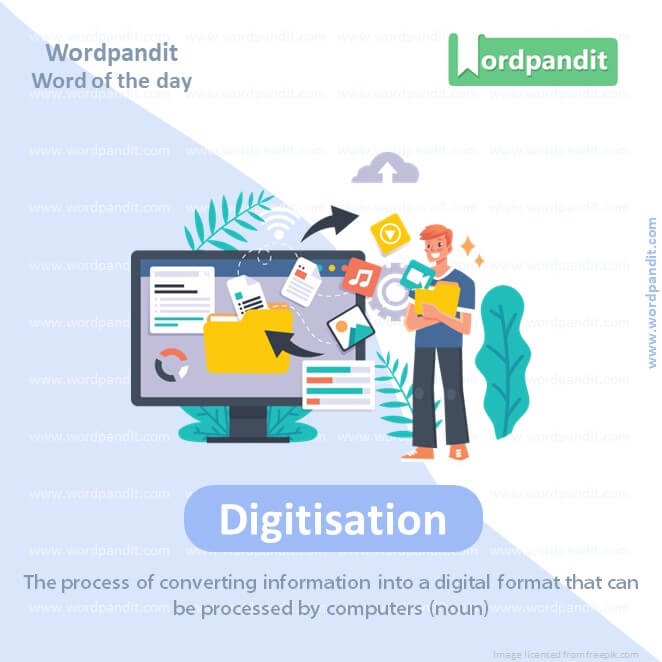
WORD-6: Digitisation
CONTEXT: Building Digital Public Infrastructure for agriculture, advancing the growth of Open Network for Digital Commerce, and increasing digitisation of land records, are some of the other highlights from its manifesto.
SOURCE: Indian Express
EXPLANATORY PARAGRAPH: Imagine taking a photo with a camera and then turning it into a digital picture on your computer. That’s like “digitization.” It means converting something from physical or analog form into digital form, often using computers or technology.
MEANING: The process of converting information into a digital format that can be processed by computers (noun).
PRONUNCIATION: dij-i-tuh-zey-shuhn
SYNONYMS: Digitalization, conversion, transformation, modernization, computerization
USAGE EXAMPLES:
1. The digitization of records made it easier to access information.
2. The library’s digitization project aimed to preserve historical documents.
3. The company invested in digitization to streamline operations.
4. Digitization has revolutionized how we store and share information.
WORD-7: Antagonise
CONTEXT: But even in cases where the child’s body carried the marks of physical punishment, parents were reluctant to pursue a complaint simply because they didn’t want to antagonise the school.
SOURCE: Indian Express
EXPLANATORY PARAGRAPH: Imagine you’re playing a game, and you keep doing things that make your friend upset or annoyed. That’s like “antagonizing.” It means behaving in a way that provokes or irritates others, often leading to conflict or tension.
MEANING: To provoke or irritate someone, often leading to conflict or opposition (verb).
PRONUNCIATION: an-tag-uh-nahyz
SYNONYMS: Provoke, irritate, annoy, provoke, incite
USAGE EXAMPLES:
1. His sarcastic remarks antagonized his coworkers.
2. The politician’s speech antagonized many members of the audience.
3. She tried not to antagonize her siblings during family gatherings.
4. The company’s decision antagonized its most loyal customers.
WORD-8: Rectification
CONTEXT: Kusum Jain took on this hardened system and challenged the bye-laws that justify the lack of transparency and rectification in cases of unfair marking.
SOURCE: Indian Express
EXPLANATORY PARAGRAPH: Imagine you made a mistake on a drawing, and then you fixed it to make it right. That’s like “rectification.” It means correcting or making something right, especially an error or mistake.
MEANING: The act of correcting or making something right, especially an error or mistake (noun).
PRONUNCIATION: rek-tuh-fi-key-shuhn
SYNONYMS: Correction, remedy, adjustment, repair, resolution
USAGE EXAMPLES:
1. The rectification of the error was crucial before submitting the report.
2. She demanded rectification of the billing mistake.
3. The committee proposed several measures for the rectification of the problem.
4. Rectification of the issue required collaboration between departments.
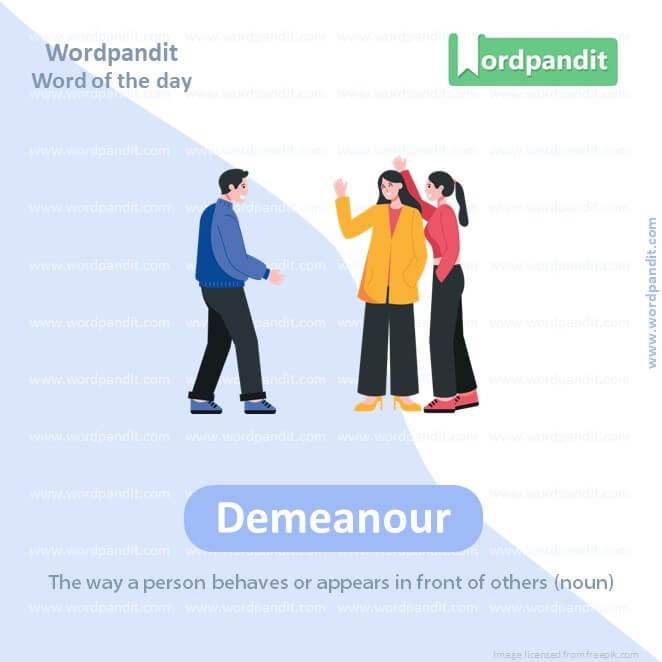
WORD-9: Demeanour
CONTEXT: Her feisty spirit and modest demeanour will remain a treasured, inspiring memory.
SOURCE: Indian Express
EXPLANATORY PARAGRAPH: Imagine you meet someone who is always calm, polite, and friendly, no matter what’s happening. That’s like their “demeanor.” It refers to a person’s outward behavior or manner, especially as it reflects their attitude or personality.
MEANING: The way a person behaves or appears in front of others (noun).
PRONUNCIATION: dih-MEE-ner
SYNONYMS: Behavior, conduct, manner, attitude, disposition
USAGE EXAMPLES:
1. His calm demeanor during the crisis reassured everyone.
2. She maintained a professional demeanor throughout the meeting.
3. The suspect’s nervous demeanor raised suspicion.
4. The teacher praised the student’s respectful demeanor in class.
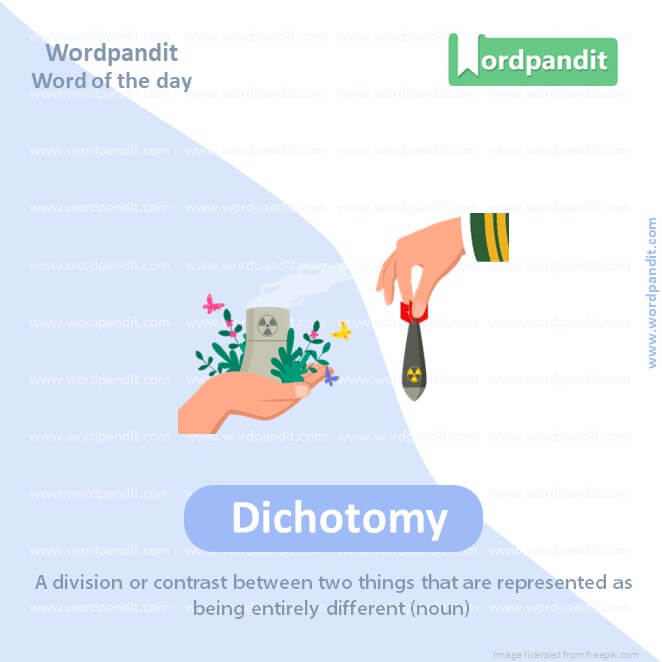
WORD-10: Dichotomy
CONTEXT: Organisations like Friends of the Earth in the UK and the National Environmental Scorecard in the US are urging political leaders to prioritise climate and nature action. However, in the vast democratic landscape of India, a dichotomy persists.
SOURCE: Hindustan times
EXPLANATORY PARAGRAPH: Imagine you have two choices that are completely opposite, like staying up late to play versus going to bed early to rest. That’s like a “dichotomy.” It refers to a division or contrast between two things that are or are represented as being opposed or entirely different.
MEANING: A division or contrast between two things that are represented as being entirely different (noun).
PRONUNCIATION: dahy-KOT-uh-mee
SYNONYMS: Contrast, division, separation, duality, opposition
USAGE EXAMPLES:
1. The book explores the dichotomy between good and evil.
2. There’s a dichotomy between his public image and private life.
3. The artist’s work often reflects the dichotomy of nature and technology.
4. The dichotomy between theory and practice is a common challenge in academia.
Vocabulary PDF
In the digital age, the way we learn languages has transformed dramatically. Among the myriad of resources at our disposal, a ‘vocabulary PDF’ serves as an incredibly effective tool. It offers a structured, accessible and convenient method of enhancing our language skills. To maximize the potential of ‘vocabulary PDF’, it is crucial to understand how to make the most of it.
First off, when venturing through the process of learning with a ‘vocabulary PDF’, maintaining consistent learner engagement is pivotal. This involves regular revision sessions where you consistently go back and refresh your memory about previously learned words. This cyclic process is particularly effective in promoting long-term retention of the vocabulary.
While leveraging a ‘vocabulary PDF’, it’s also beneficial to annotate as you progress. Annotation brings an interactive aspect to your learning, making it dynamic and personalized. Make notes of context, synonyms, antonyms, or even create sentences using the new words. This engagement with the ‘vocabulary PDF’ aids in imbibing the meaning and usage of the words.
Another strategic approach to mastering a ‘vocabulary PDF’ is to utilize a reading aloud technique. Listening to the words as you speak them out loud can stimulate auditory learning, enhancing your pronunciation and comprehension of the vocabulary.
When using a ‘vocabulary PDF’, it is also advantageous to supplement your learning through applications of the new words. Write an essay, engage in a conversation, or post on social media using the new words. This reinforces the acquired vocabulary, augmenting your grasp over them.
In conclusion, a ‘vocabulary PDF’ is a potent instrument that, when harnessed effectively, can significantly bolster your language learning journey. It requires a blend of consistent revision, active annotation, auditory engagement, and practical application. With these strategies in hand, mastering ‘vocabulary PDF’ can be a rewarding and successful experience that fuels your linguistic endeavors.











